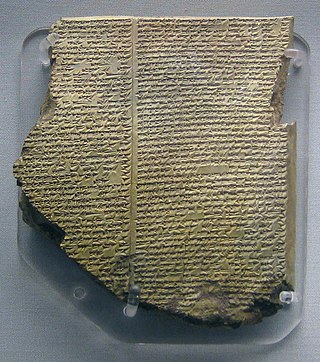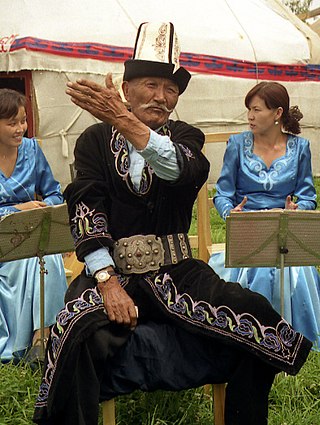
An epic poem, or simply an epic, is a lengthy narrative poem typically about the extraordinary deeds of extraordinary characters who, in dealings with gods or other superhuman forces, gave shape to the mortal universe for their descendants.

Oral tradition, or oral lore, is a form of human communication in which knowledge, art, ideas and culture are received, preserved, and transmitted orally from one generation to another. The transmission is through speech or song and may include folktales, ballads, chants, prose or poetry. It is a medium of communication for a society to transmit oral history, oral literature, oral law and other knowledge across generations without a writing system, or in parallel to a writing system.

The Nibelungenlied, translated as The Song of the Nibelungs, is an epic poem written around 1200 in Middle High German. Its anonymous poet was likely from the region of Passau. The Nibelungenlied is based on an oral tradition of Germanic heroic legend that has some of its origin in historic events and individuals of the 5th and 6th centuries and that spread throughout almost all of Germanic-speaking Europe. Scandinavian parallels to the German poem are found especially in the heroic lays of the Poetic Edda and in the Völsunga saga.

Serbian epic poetry is a form of epic poetry created by Serbs originating in today's Serbia, Bosnia and Herzegovina, Croatia, Montenegro and North Macedonia. The main cycles were composed by unknown Serb authors between the 14th and 19th centuries. They are largely concerned with historical events and personages. The instrument accompanying the epic poetry is the gusle.
The gusle or lahuta is a bowed single-stringed musical instrument traditionally used in the Dinarides region of Southeastern Europe. The instrument is always accompanied by singing; musical folklore, specifically epic poetry. The gusle player holds the instrument vertically between the knees, with the left hand fingers on the string. The string is never pressed to the neck, giving a harmonic and unique sound.
Narrative poetry is a form of poetry that tells a story, often using the voices of both a narrator and characters; the entire story is usually written in metered verse. Narrative poems do not need to rhyme. The poems that make up this genre may be short or long, and the story it relates to may be complex. It is normally dramatic, with various characters. Narrative poems include all epic poetry, and the various types of "lay", most ballads, and some idylls, as well as many poems not falling into a distinct type.
The folklore of India encompasses the folklore of the nation of India and the Indian subcontinent. India is an ethnically and religiously diverse country. Given this diversity, it is difficult to generalize the vast folklore of India as a unit.

A bylina is a type of Russian oral epic poem.
Yukar are Ainu sagas that form a long rich tradition of oral literature. In older periods, the epics were performed by both men and women; during the 19th and early 20th centuries, when Ainu culture was in decline, women were generally the most skillful performers. Traditional tales describe floating worlds with Ainu mosir, or the land of the humans, resting on the back of a fish whose movements cause earthquakes.

Ainu music is the musical tradition of the Ainu people of northern Japan. Ainu people have no indigenous system of writing, and so have traditionally inherited the folklore and the laws of their culture orally, often through music.

Chief Daniel Olorunfẹmi Fágúnwà MBE, popularly known as D. O. Fágúnwà, was a Nigerian author of Yorùbá heritage who pioneered the Yorùbá language novel.

John Pepper Clark-Bekederemo was a Nigerian poet and playwright. He popularly published as J. P. Clark and John Pepper Clark.
Epic is a narrative genre characterised by its length, scope, and subject matter. The defining characteristics of the genre are mostly derived from its roots in ancient epics. An epic is not limited to the traditional medium of oral poetry, but has expanded to include modern mediums including film, theater, television shows, novels, and video games.

Albanian epic poetry is a form of epic poetry created by the Albanian people. It consists of a longstanding oral tradition still very much alive. A good number of Albanian epic singers can be found today in Kosovo and northern Albania, and some also in Montenegro. The Albanian traditional singing of epic verse from memory is one of the last survivors of its kind in modern Europe, and the last survivor of the Balkan traditions.

Al-Sirah al-Hilaliyyah, also known as the Sirat Bani Hilal or the al-Hilali epic, is an Arabic epic oral poem that recounts the tale of the journey of the Bedouin tribe of the Banu Hilal from Najd in Arabia to Tunisia and Algeria via Egypt. It is built around historical events that took place in the 11th century. The Banu Hilal were dominant in central North Africa for over a century before their annihilation by the Almohads. The epic is folkloric and oral, not having been committed to writing until relatively recent times, and doesn't have a well-defined date of creation. Of the dozen odd major oral epic poems that developed within the Arab folk tradition between the Middle Ages and the 19th century, Sirat Bani Hilal is today the only one that is still performed in its integral musical form. The longest notable version contains 1,000,000 lines, the poet could sing this version about 100 hours. The epic, once widespread throughout the Middle East, is today performed only in Egypt. In 2008 it was inscribed on UNESCO's Representative List of the Intangible Cultural Heritage of Humanity.
Isidore Okpewho, NNOM, was a Nigerian novelist and critic. He won the 1976 African Arts Prize for Literature, and the 1993 Commonwealth Writers' Prize, Best Book Africa.

Germanic heroic legend is the heroic literary tradition of the Germanic-speaking peoples, most of which originates or is set in the Migration Period. Stories from this time period, to which others were added later, were transmitted orally, traveled widely among the Germanic speaking peoples, and were known in many variants. These legends typically reworked historical events or personages in the manner of oral poetry, forming a heroic age. Heroes in these legends often display a heroic ethos emphasizing honor, glory, and loyalty above other concerns. Like Germanic mythology, heroic legend is a genre of Germanic folklore.

Darangen is a Maranao epic poem from the Lake Lanao region of Mindanao, Philippines. It consists of 17 cycles with 72,000 lines in iambic tetrameter or catalectic trochaic tetrameter. Each cycle pertains to a different self-contained story. The most notable of which deals with the exploits of the hero Bantugan.

Epic poetry, or tuuli in Mongolian, is an important genre of Mongol oral literature, with features reminiscent of Germanic alliterative verse. The two most well-known epics are the Jangar and the Geser. These tuuli are commonly sung with instruments such as the Morin khuur and the Tovshuur (lute). Most epics deal with topics of the history of the Mongols, their ideal worlds and heroes, and the acquisition of new lands. Epics are performed mostly as celebrations or during important events. Mongol epic poetry has, as of 2009, been on the UNESCO List of Intangible Cultural Heritage in Need of Urgent Safeguarding.
Ogboinba is a mythical sorceress who appears in the folklore of the Ijo (Ijaw) people of Nigeria. She is noted for attempting to use her supernatural powers to challenge Woyengi, the supreme deity of the Ijo, into changing her chosen fate of childlessness. While escaping Woyengi's anger, she enters the eyes of a pregnant woman, and remains trapped there. The Ijo say that when you look into the eyes of another person, it is Ogboinba who looks back at you.












